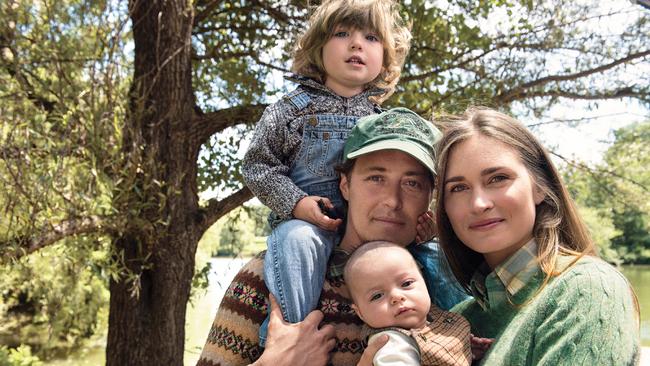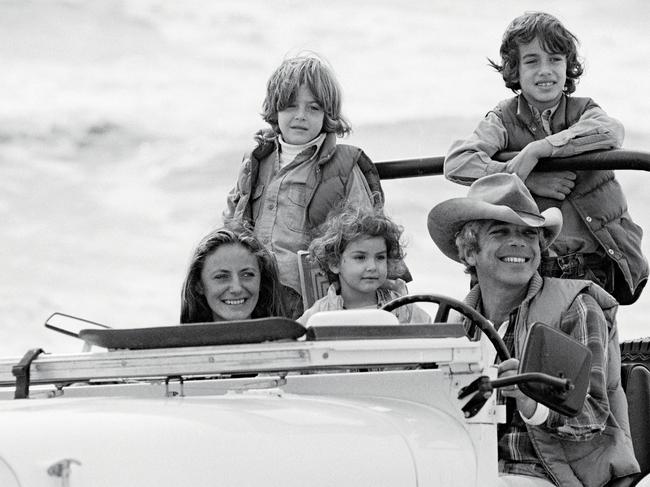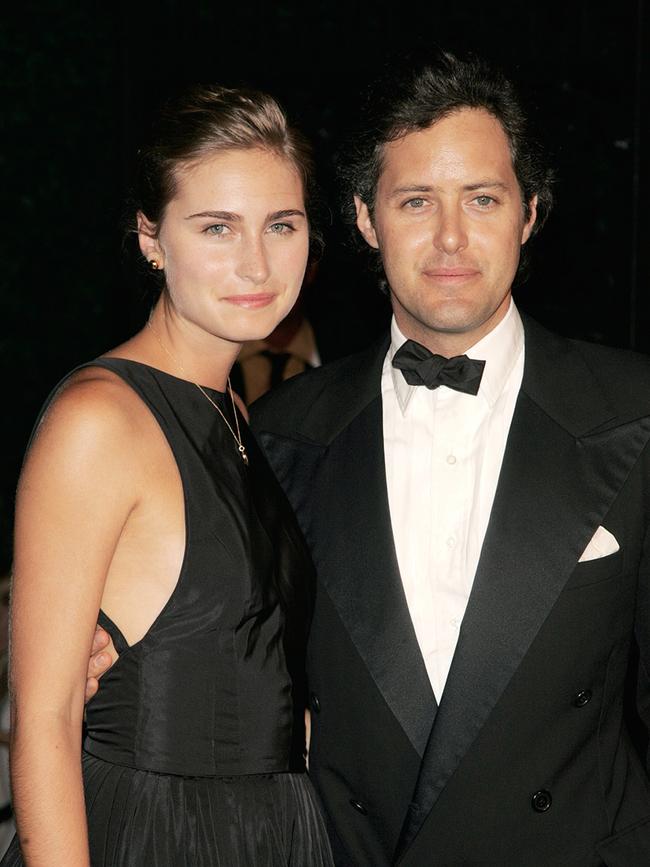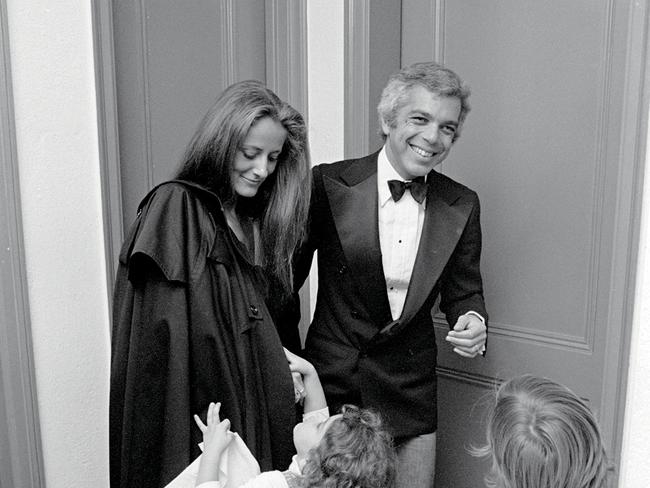David Lauren’s reflection on life in a fashion royal family
David Lauren, son of fashion legend, Ralph Lauren, discusses navigating uncertain times with family, ingenuity and a dream-building focus: “I can honestly say that my dad has been there for me as a best friend, confidant and supporter.”

David Lauren is hunkered down in the Hamptons, videoing in from his home office. It’s late in the evening, there’s a chance of snow, his two sons have gone to bed and he is back at his desk. “That’s the silver lining in all of this,” he says, “more time with your kids.” Lauren, 49, is fashion royalty, the son of Ralph Lauren, chief innovation officer and vice chairman of his father’s luxury corporation. He explains that family — in both the personal and business sense — is on his mind right now, which could be a clue to the stickier question of how the brand is thinking about selling fashion in these strange and cruel times.
There’s also a new baby to plan for: his wife, Lauren Bush Lauren, the founder of impact-driven lifestyle brand FEED Projects, granddaughter of former American President, George H. W. Bush, and niece of former American President, George W. Bush, has just announced the couple’s third pregnancy.
“I grew up in a close family; I feel lucky that Mum and Dad prioritised their kids no matter how busy they were. They were home for dinner, they were committed to our homework, they always knew what was going on in our lives, they still do,” Lauren says. “I hope to bring that same spirit to my own family.”

Late last year, the company announced a new partnership with the Australian Open to be the tournament’s official outfitter. It’s the company’s third Grand Slam title along with Wimbledon and the US Open. Strategically, the deal ticks off key business goals in the Asia-Pacific markets, but the tour’s eco-conscious fashion is the real talking point: its Melbourne uniforms will be woven from recycled ball cans and water bottles, an expansion on its Earth Polo initiative.
“When my father started the company he called it Polo, because he loved the attitude and the spirit of that sporty lifestyle, the endurance and the intensity of the athletes married to the elegance of its spectators. So, the iconography of [the Australian Open] is a perfect fit, it’s exciting and we’re going to bring new energy to it. We came to the process a little late, but with each year you’ll start to see more and more newness in the products, and sustainability is certainly key.”
Lauren also sees green fashion working across the brand in other ways. “It’s influencing so many of our decisions — the way in which we design products, the materials we use, the way we open stores — decisions at every level. I think it used to be thought of as just a nice idea in the industry but we now know, very clearly, that it’s essential for us to honour our employees, our customers and our environment by committing to better processes and a better future. There’s a groundswell happening in the world today and that’s a good thing. We are seeing the effects of global warming; we are seeing our world changing. We’re also seeing people who are able to make real change and we want to be part of that.”

Innovation has always propelled the company forward. The American establishment was one of the first to launch an online channel and fully digitise its product lines, there’s an e-game in the offering and virtual showrooms are now a thing: “I’m excited our team is constantly exploring new projects, it’s not about having one idea. It’s the sense that we are a modern classic but we’re constantly evolving; doing things that no other brands in the world can say they’re doing. We are always thinking about new ways for our customers to shop, how to better the experience. It’s possible that in the next few years people are going to want to rent their clothes, they’re going to want to access vintage and there will be newer technologies. That sort of thinking helps us tell our story in fresh ways.”
Indeed, the aspirational narrative has long been key to Ralph Lauren’s success, ever since the man himself began selling silk ties in 1967 before going on to shape the American dream. On the runway, his signature sartorial cues have included Wall Street pinstripes, homages to the American West, jazz club dresses, Edwardian ruffles and prep-school blazers. Freedom! Hope! Romance! All that, together with his philanthropic efforts, has earned the American designer a knighthood.
Rather than carrying the weight of his father’s legacy however, Lauren says Ralph’s influence has been a lodestar. “I can honestly say that my dad has been there for me as a best friend, confidant and supporter, and he has mentored me in business for the last 20 years, which has had a huge influence,” Lauren explains. “I’ve learnt that every day you need to get to know the customer and the market better. Whether we’re opening a store in China or staging a fashion show in Milan, you have to be constantly tuned in to how effective our initiatives are, and always thinking about new ways to break ground.”

Was it difficult growing up in such a famous family? David’s mother Ricky — a painter,
author and photographer — is the house’s quintessential muse, while his siblings forged different paths: David’s brother Andrew is a film producer and his sister Dylan founded her own upmarket Candy Bar emporium. Lauren says: “I remember going to Japan when I was 14, and getting out of the car in front of a restaurant where thousands of people had lined the streets, they’d crowded two of three blocks all waiting to take pictures of our family. It was overwhelming but my parents played down that sort of thing.”
For now, Lauren is looking ahead and reflecting on the tumultuous year. He says he’s naturally a positive person but willing himself to be more so. “I’ve learnt to be a lot more grateful. I feel grateful to be able to stay home with my family and watch my kids grow up, and to see that my friends and co-workers have good health. We are blessed in the sense that, as a company, we’ve been able to be very philanthropic. When the pandemic first hit, we gave $10 million to relief funds, so I am grateful that our company isn’t just about selling shirts but also about giving back to our communities. And although it’s been a tough road with some of our stores not able to operate and employees suffering through different experiences, I think we’ve learnt to work more closely together. In many ways, we are coming through this, perhaps more humble and as better communicators. I’m passionate about finding new dreams for us moving forward,” he says. “You know, this company was never just about the clothes, the shirt, the dress, it was always about the dream. I think now, more than ever, we all need to dream, that’s the most exciting thing.”
This story appears in Vogue Australia’s January issue, on sale now.
